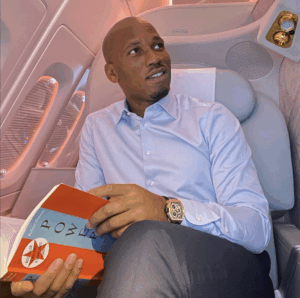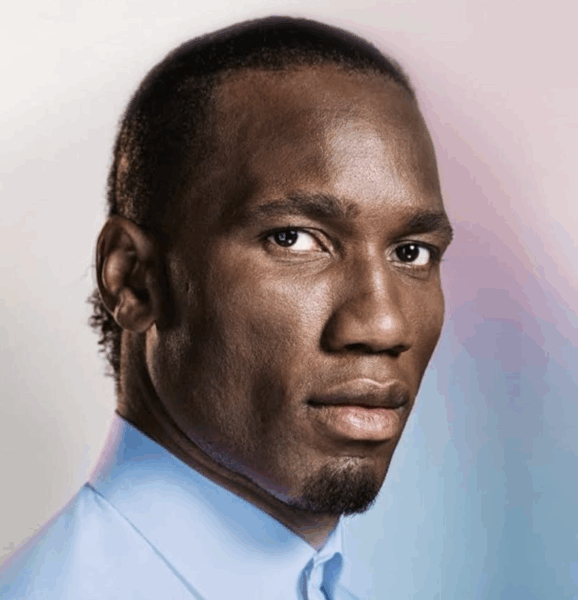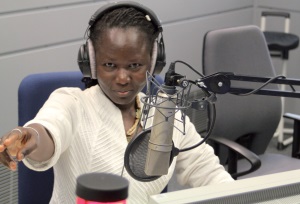Interview with Didier Drogba, Torchbearer of the Republic of Côte d’Ivoire
Interview conducted by Ramata Soré, journalist, CNN Prize 2006.
Didier Drogba, born on March 11, 1978 in Abidjan, is much more than a footballer: he is a conscience in motion, a deep voice that resonates far beyond the stadiums, a heart beating for Africa. From 2004 to 2012, and then in 2014-2015, he wrote one of Chelsea FC’s greatest epics in England, scoring 164 goals, including the memorable one on May 19, 2012 in the final of the prestigious Champions League, an equalizing goal and a decisive penalty kick, giving Chelsea their first European title in history. As captain of the Ivory Coast Elephants, he carried the hopes of a nation during three World Cups: 2006, 2010, 2014, and was crowned African Player of the Year in 2006. But it was in October 2005 that his aura transcended the realm of sports: the day after a historic qualification for the World Cup, while his country, Côte d’Ivoire, was divided, he implored, on his knees, the Ivorian combatants to lay down their arms, a rare gesture that temporarily halted the civil war.
In 2007, he established the “Didier Drogba Foundation,” with headquarters in Abidjan and London, deploying his influence for education, health, and empowerment of African communities. Since his retirement in 2018, he embodies a figure of unity, commitment, and peace, and remains one of the most beloved faces on the continent. Drogba is not just a name: he is a living memory, a pulse of hope, a star that watches over. In his eyes, the fire of a people and the tenderness of a father. He scored goals, yes, but he mainly touched souls. This interview is not just about football. It is also a pilgrimage to what a man can become when he chooses to listen to his inner truth. Therefore, Didier Drogba is much more than a legend: he is a presence, a gentle force, an inner voice that whispers without noise.
Today, he no longer plays on grass. He plays for peace, justice, and love. And he opens up here, wholehearted, without evasion, from London, England where he is based. Let’s meet!
From Shadow to Light: What promise did you make to yourself when leaving Abidjan for France at 5 years old?
When I left at 5 years old, there was no grand philosophical promise. I was a little boy leaving his parents for a better life, a childhood dream. The only promise I made to myself was to make my father and mother proud, not to disappoint them, to work hard to one day be able to help them. It was a simple and pure child’s promise. I could never have imagined that this uprooting, which was initially a trial, would give me this dual culture, this view of the world that not only shaped me, but also forged my unbreakable bond with Africa. This uprooting made me a bridge between two worlds.
If you could see little Didier again right now, what would you whisper in his ear today?
I would take him in my arms. I would tell him never to doubt, always to believe in his potential. I would tell him that the road will be long, filled with sacrifices and wounds, but that each trial is a lesson. I would tell him never to forget where he comes from, to keep his feet bare on the warm ground of Yopougon, even when he treads the lawns of the greatest stadiums. Above all, I would tell him that his greatest goal will not be to score, but to love and serve.
What does it truly mean to “be a legend”? Have you ever felt lonely at the top?
“Being a legend” is not a question of trophies or millions. It is the echo you leave in people’s hearts. It is the legacy you build, not the one you leave behind. I have often felt lonely at the top. The weight of responsibility, the pressure, the distance from family… Your victories on the field are celebrated, but you are alone with your doubts. And it is in those moments of solitude that I understood that true wealth was not the echo of glory, but the strength of my heart.
What dream have you never dared to reveal to anyone?
My secret dream is not football, but to one day have a completely autonomous African continent, where peace is the only rule and education the only religion. I dream of an Africa that no longer extends a hand, but proudly stands up, where youth no longer needs to cross dangerous seas to seek a future. This dream haunts me, as it is the driving force behind everything I undertake.
You say you dream of an Africa standing, autonomous, and proud. If you had to choose three seeds to sow today to make this dream a reality in twenty years, what would they be, and how would you protect them from the drought and storms of political and social life?
If I had to choose only three, I would say: The seed of quality education: not just education limited to learning, but education that conveys self-awareness, knowledge of one’s history, and potential. An education that does not just produce workers, but builders. The seed of peace and reconciliation: because without peace, nothing is possible. This seed thrives on dialogue, acceptance of others, justice, and memory. It must be protected by teaching children from a young age the importance of unity and forgiveness. The seed of entrepreneurship and innovation: autonomy comes from the ability to create wealth oneself. This seed must be nurtured with support, equitable financing, and policies that encourage youth to dare, to undertake, to not fear failure. To protect these seeds from political and social storms, they must be planted in the hearts of the young. Once these values are rooted in them, no storm can uproot them. Youth is our rampart, our hope, and the future lies within them.
In your commitment to health and education… have you encountered resistance? What battle do you still have to fight?
Yes, resistance is there, it is real, political, corporatist. The will to empower peoples is sometimes seen as a threat by those who have an interest in keeping them dependent. The battle I still have to fight is that of perseverance, never giving up, continuing to build schools, clinics, providing tools for young people to rise on their own. Realizing this vision is a daily struggle and it is never truly finished.
Have you ever had the intuition that some sporting victories were guided by invisible forces?
Absolutely. I have never felt alone on the field. There were games, moments where I felt a force transcending me. The goal on May 19, 2012, in the Champions League final, is the most striking example. It wasn’t just me scoring, it was the force of a people, the energy of an entire continent, of my ancestors, carrying me. I have always believed I was a channel for something greater, that my mission did not end with a simple match.
What role do you believe you have embodied: that of the warrior, the healer, the passer, or the silent prophet?
I believe I have been a bit of all four. I have been a warrior on the field, fighting for every ball, every victory. I have been a healer with my call for peace. I have been a passer by bridging cultures and generations. And today, I am a silent prophet, sowing seeds of peace, knowledge, and hope through my foundation, for a better future.
The silence after the career is sometimes more deafening than the cries of the crowd. What is your personal ritual?
The silence can be deafening, yes, but it is also where I find myself. My ritual is simple: I isolate myself, connect with my roots, recharge with my family. I return to Côte d’Ivoire, to walk on the land of my ancestors, feel the pulse of my people. It is in silence that I detach from the icon to find the man, Didier, with his doubts and dreams.
Fame is a difficult mask to remove. Have you found a space where you can be 100% true?
Fame is an armor we wear, but it is not a mask that has stolen me. I have kept my inner Didier, the simple man who loves to laugh and share. I find this space of truth with my family, my childhood friends. That is where I can be vulnerable, free. My children see me as their father, not as a giant. That is what brings me back to the essential.
Is your new love life aligned with the inner truth you have discovered?
I believe a successful couple life is built on truth and mutual respect. Life is a path of evolution. I have always believed in the power of a couple, an alliance where we support each other, where we grow together, in truth and respect for fundamental values.
What inner legacy do you want to leave to your offspring?
I want to leave them the legacy of dignity, strength of character, love for Africa. Money and fame fade away. But values, the ability to fight for what is right, to reach out to others, to honor one’s roots, that remains forever. I want them to be proud of being Africans, to be beings of heart and conviction.
How do you envision the birth of a generation of young African leaders, shaped not only by knowledge and competence, but by integrity, service, and transparency?
I see this generation as an unstoppable force. To emerge, they must be given the necessary tools. It is not enough to train experts, we must train men and women of heart, conscience, and conviction. This requires leading by example. We need elders to show them that integrity is not a weakness, that service is not submission, and that transparency is the only path to trust. This new generation must be driven by love for others and the nation.
On October 8, 2005, you pleaded with combatants in the political crisis in Côte d’Ivoire to lay down their arms, what invisible wounds did you subsequently have to bear?
This appeal was a cry from the heart, a moment of pure emotion. But it also created invisible wounds. The political weight of this act was heavy to bear. I had hopes, frustrations, and a sense of pain seeing that peace remained fragile. It is a wound that is not visible, but remains within me, a scar of a responsibility I never sought.
Didier, your cry for peace touched hearts but left you with invisible scars. Today, with a new platform, what words, more enduring and deeply rooted in the Ivorian soul, would you choose to speak?
My words would not be a cry, but a whisper. I would no longer speak to combatants, but to families, mothers, children: “Peace is not decreed, it is lived. It is built in homes, in schools, in villages, because unity is not uniformity, it is the strength of our differences. Let us never forget where we come from, and always honor those who have suffered. My message is one of hope and perseverance.”
If the force that carried you to the goal in the Champions League final became your companion in leading a country, how would you invite it to walk with you in every decision, every law, every act?
This force is not mine, it is that of an entire people. Inviting it to walk with me in leading a country would be to listen to it. It would be to make the voice of the people my guide. Every decision, every law, every act would be inspired by the needs, dreams, and hopes of Ivorians. Listening, empathy, love for others, that is the force that carried me, and it is the only force that can lead a nation towards a just and prosperous future.

What is your intimate view of today’s Côte d’Ivoire and what role do you feel called to play?
I look at Côte d’Ivoire with immense love, but also great concern. The youth is disillusioned, crises are recurrent. But I also see immense strength, incredible resilience. I feel called to be a bridge, a unifier, a voice that continues to preach unity and dialogue. My role is to work for the education and health of this youth, to give them the means to build a solid future, to help them find hope again.
Beyond Côte d’Ivoire, what is your message to the peoples of West Africa?
My message is simple: unity is our only strength. In this era of coups, manipulations, and information wars, we must not let ourselves be divided. We must come together, speak with one voice. Africa is a young continent, full of potential. Let no one tell us we are incapable of taking charge. The solution lies within us, in our collective strength and love for others.
What message lives in your heart and that you now wish to embody?
The message I live and wish to embody is that of love. A love that is a gentle force, not naive, but the only solid foundation to build upon. Love that builds nations, creates bridges, heals the wounds of the past. If I were to whisper it to the universe, I would say: “Love your neighbor as yourself, for it is the only key to a common future.”
What deep call have you received but have not yet followed? Why?
The call to fully engage in politics is a call I have received several times, but have always pushed back. I acknowledge it is a huge mission, but it is also a complex terrain, filled with challenges that could divert me from my main goal: being a voice for the young and voiceless. I fear that the game of power could steal my freedom of speech, my sincerity. It is a mission I postpone, as I believe my fight is more effective outside of political arenas.
Have you considered that your greatest legendary achievement might not be the goal that thrilled the world, but rather being the leader of an entire generation of awakened, upright, and responsible Africans, who would one day say: “It was Didier who showed us that governing can be an act of love,” reinventing its rules, reimagining a leadership grounded in conscience, transparency, honesty, and responsibility, transforming not only politics but also those who serve it?
I had not thought of it in those terms, but your words resound within me as prophecy. If my greatest achievement could be to show a generation that governing is an act of love, then my life would hold a meaning far greater than football. I have always believed that love is the most powerful force in the world. And if I could be the one who, through my actions, values, and commitment, inspires leaders to govern with love, conscience, and transparency, then I would be the happiest man alive.
If a child were to read a book about your life, what message would you want him to retain?
I would want him to retain that greatness is not measured by trophies, but by scars. That my failures taught me more than my victories, that my tears made me stronger. I would want him to understand that my unseen choices, those made in love, were the most important. I would want him to read of a man who always loved Africa, and who always believed in humanity. For that is the true victory. Thank you once again for this beautiful opportunity to share myself.
The soul of a giant does not always require cleats to excel. Though Didier Drogba has left the stadiums, he remains upon the field. He plays for today, for the children he cherishes, for a continent he embodies. He walks unveiled. His heart is open. Through him, Africa no longer begs, it rises. And Côte d’Ivoire, the land of his birth, beats in rhythm with a politics that seeks to restore dignity to its people, and above all, dignity to those who serve it. With a “national team of conscience,” where each minister fulfils their role with passion, discipline, and love for the jersey, the jersey here being the Ivorian nation, animated by love of the other, one can, if one listens closely, hear in the words of Didier Drogba and his envisioned government: “Love has built our nation.”
About Ramata Soré
Ramata Soré holds a Master’s degree in Information and Communication Strategies from the University of Ouagadougou. She has worked in several newsrooms, including the biweekly L’Événement and Le Pays. Winner of the prestigious CNN MultiChoice Award in 2006 for a report on homosexuality in Burkina Faso, as well as the Reuters IUCN Media Award in 2008 for an environmental story, she is recognized for her courage in addressing taboo subjects, her pan-Africanism, and her strong passion for journalism.



